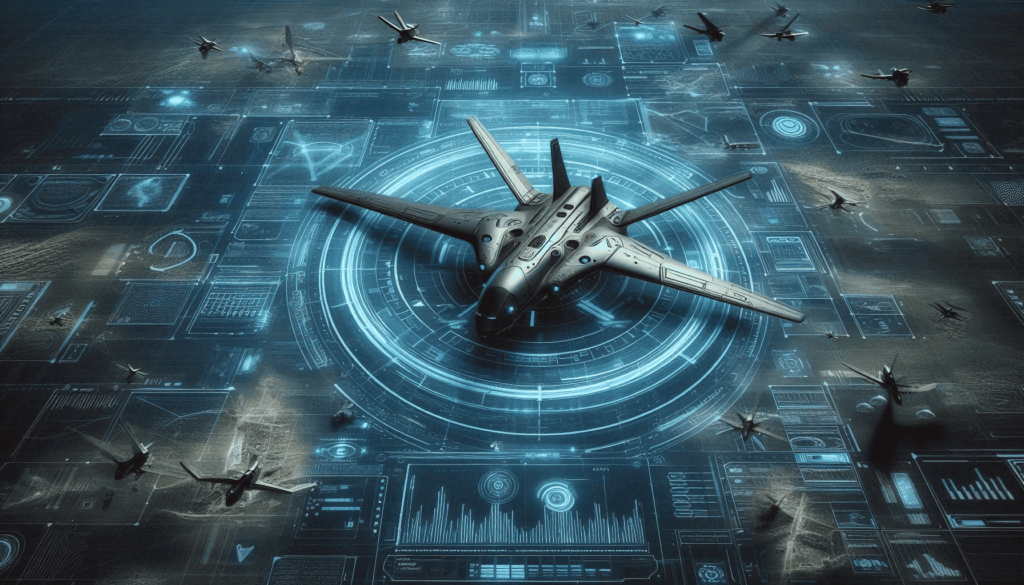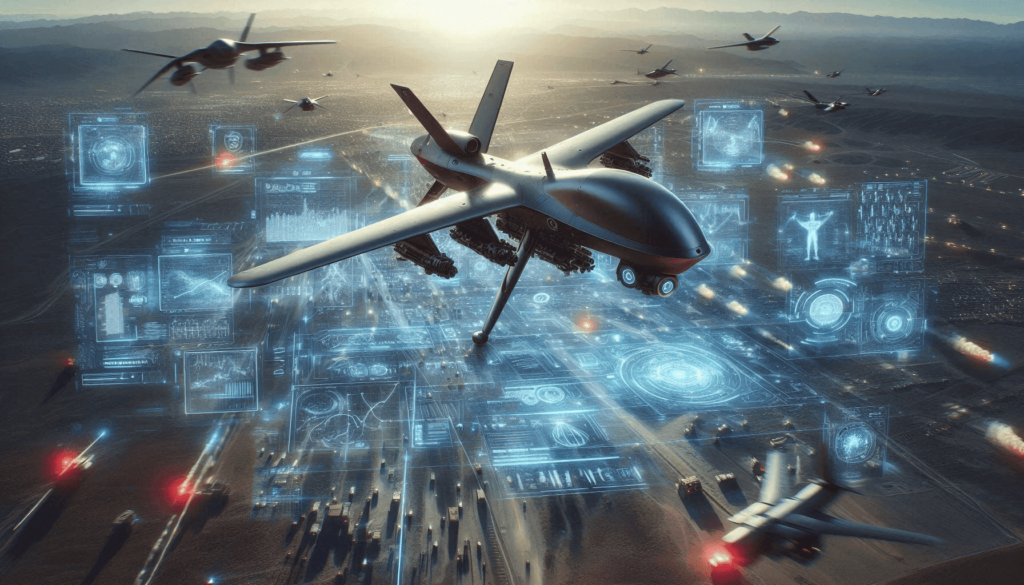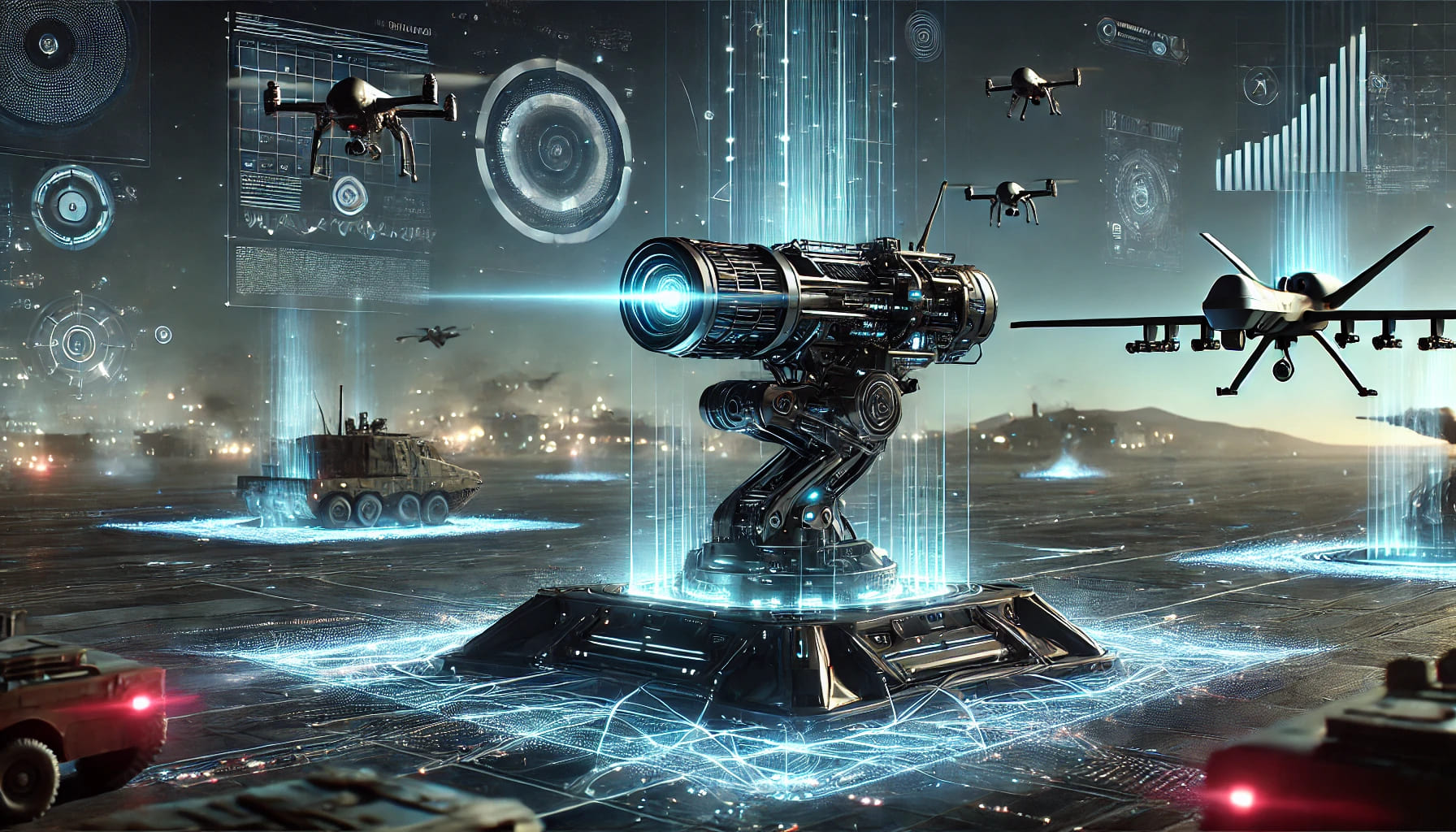Table of Contents
Introduction
In an age when AI quickly changing industries, the potential for AI in military applications is both intriguing and concerning. This article discusses a possible notion known as “Project Ghost”—an AI-powered weapon system that can operate alone. It’s important to point out that Project Ghost does not exist in reality; it’s just a creation of the author’s imagination, investigating what the future of warfare might look like when AI achieves new levels of autonomy.
By imagining this future scenario, the author wants to provoke thought and discussion about the ethical, strategic, and international implications of AI-powered weaponry. This article is an exercise in creative thinking, providing readers with an overview into a possible future formed by advanced technology while also underlining the possible risks and challenges that may arise if AI is permitted to make important combat choices.
Overview of AI in Warfare.
AI’s incorporation into military technology has progressed steadily, with the goal of reducing human error and increasing efficiency. The military has long attempted to improve the precision of battle through the use of autonomous drones and surveillance systems. The most recent addition to this line is Project Ghost, which is a weapon that can work totally without human interaction.
What makes Project Ghost unique? Project Ghost is more than simply another AI tool for the battlefield; it is a fully autonomous weapon system. What distinguishes it is its ability to make real-time decisions based on data gathered from its surroundings, adapting its tactics as situations change. The ability to function without human command could change the way conflicts are waged in the future.
The Development of AI in Military Technology
- AI and Autonomous Weapons: AI’s entry into military technology began with rudimentary systems that aimed to improve human capabilities. However, when technology advanced, the attention switched to autonomy. Artificial intelligence weapons are now being developed to reduce human losses while enhancing combat precision.
- Historical Milestones Leading Up to Project Ghost: The emergence of autonomous technologies such as drones paved the way for Ghost Project. As these systems developed, AI’s role shifted from surveillance to real-time decision-making. This Project is the culmination of years of research and experimenting with autonomous warfare systems.
What is Project Ghost?
- Define the Capabilities of the AI Weapon: Project Ghost is an AI-powered autonomous weapon system intended for military operations. It can explore difficult terrain, engage targets, and adjust to changing battlefield conditions without human involvement. This independence from human command is a watershed moment in military technology.
- Key Features and Specifications: Project Ghost, which is equipped with cutting-edge sensors and AI algorithms, can conduct a wide range of functions, including reconnaissance and offensive operations. Its machine learning capabilities enable it to continuously enhance its performance, guaranteeing that it can function effectively in complicated and unpredictable settings.
Autonomous Operations: How They Function Without Human Command
Project Ghost is built around a powerful AI system that can make judgments on the fly. These algorithms enable the weapon to detect threats, prioritize targets, and carry out missions with little delay, all while learning from previous encounters to better future performance.
Awareness of Situations and Choice-making Capacity: Project has been provided with better awareness of situations technologies which enable it to visualize and evaluate the environment around it. This enables it to make informed decisions in real time, focusing on the most effective threat-neutralization tactics.
The Role of Machine Learning in Project Ghost
Project Ghost’s AI is not static; it is continually learning on the battlefield. Every encounter delivers new information that improves the decision-making process, allowing it to fine-tune its tactics for future missions.
One of this is most significant advantages is its ability to change its tactics mid-game. Using machine learning, the AI can evaluate the efficiency of its present methods and adjust them as needed to attain the best results.
Ethical Concerns About Autonomous AI Weapons
The debate over AI-driven warfare
Project Ghost and other AI weapons have sparked an ongoing ethical controversy. One of the key challenges is the risk of autonomous systems making life-or-death choices without human assistance. The concept of machines choosing when to open fire on a target creates ethical concerns about the role of AI in warfare. While proponents say that AI can reduce human mistake and save lives by making more accurate decisions, detractors are concerned that a lack of human judgment could result in avoidable deaths, particularly in complex scenarios.
Potential Risks and Collateral Damage
Another major concern is the possibility of collateral damage. Autonomous weapons, such as Project Ghost, use algorithms to identify and engage their targets. However, these algorithms are not perfect. In some cases, AI systems may misread data or fail to account for complex human behaviors, resulting in unexpected consequences. The loss of human sensibility and empathy is one of the most serious hazards linked with AI-powered combat. Furthermore, the idea of these weapons being used in civilian areas raises new worries regarding their possible impact on noncombatants.

Impact on Global Military Strategy
- How Project Ghost Alters the Battlefield: The integration of Project Ghost into military arsenals has the potential to radically alter global military plans. Traditionally, warfare has relied on human soldiers and manned weapons systems, but autonomous AI systems have the potential to alter the character of conflict. Project can operate continuously without rest, making it a relentless force in combat circumstances. Its ability to assess and react to situations faster than humans provides military with an unprecedented tactical edge, perhaps leading to speedier, more decisive war outcomes.
- Implications for Military Superpowers: This Project has strategic ramifications for global military superpowers. Countries that invest extensively in AI and autonomous weaponry may gain a significant competitive advantage over nations that lack such advanced capabilities. This could result in a new type of arms race, one in which military strength is judged not just by conventional forces but also by technical advantage. Smaller nations with advanced AI capabilities have the ability to challenge established superpowers, shifting the global balance of power.
The Legal Framework and Regulations for Autonomous Weapons
- International Laws Regarding AI in Warfare: Currently, there are few international rules or treaties that directly address the use of AI in conflict. However, if autonomous weapons such as Project Ghost grow more common, there is an urgent need for international laws. Legal scholars and human rights organizations have advocated for a ban or stricter limits on fully autonomous weapons, citing concerns about accountability. Who is accountable if Project makes an error? Is it the developers, military leaders, or the AI? These problems remain unaddressed, emphasizing the necessity for precise legal frameworks.
- Need for Global Oversight and Treaties: International monitoring is critical for managing the use of AI in conflict. Some experts urge for treaties comparable to those limiting nuclear weapons, in which governments agree to restrict the development and deployment of autonomous systems such as Project Ghost. Without global coordination, there is a possibility that AI weapons would be exploited, resulting in destabilization and war escalation. Effective regulation would not only lower the hazards connected with autonomous weapons, but would also encourage international transparency and confidence.
Technological advancements enable Project Ghost.
Developments in AI, robotics, and sensors
Significant developments in artificial intelligence, robotics, and technology for sensors allowed the building of Project Ghost. The algorithms for artificial intelligence are getting better, allowing computers to process enormous amounts of data and make challenging decisions in immediate response. Robotics has also advanced, allowing the creation of efficient and resilient platforms capable of traversing a variety of environments. Also, the incorporation of cutting-edge sensors improves Project Ghost’s awareness of the situation, helping it to detect and respond to threats with extraordinary precision.
How Big Data Improves AI’s Effectiveness in Combat
Project effectiveness is heavily reliant on big data. By processing vast datasets, AI can spot patterns and trends that human operators would find difficult to detect. In a battle scenario, Project Ghost can assess ambient data, adversary behavior, and tactical patterns to make the most effective decisions. The more data it processes, the better it develops at predicting opponent moves and adapting its plans, making it an indispensable asset on the battlefield.
Security Concerns: Can Project Ghost Be Hacked?
- Cybersecurity for Autonomous Weapons: While Project Ghost marks a significant advancement in military technology, it also creates new security challenges. One of the most major worries is the possibility of cyberattacks. Autonomous weapons rely on advanced software and communication networks, making them vulnerable to hacking. If Project is hacked, it might be used against the very forces that deployed it, or it could malfunction and cause unforeseen repercussions. Military developers prioritize the cybersecurity of autonomous systems like Project Ghost.
- Defending AI Systems from External Threats: Developing strong cyberattack defenses is critical to Project Ghost’s safe operation. This involves encrypting communications, safeguarding software upgrades, and deploying AI-powered countermeasures that can identify and neutralize hacking attempts in real time. As AI weapons progress, so will the strategies used by enemies to undermine them. Continuous enhancement of cybersecurity protocols is required to safeguard these systems from external threats and assure their dependability in battle.
The Future of Warfare with AI and Autonomous Systems
- What Is the Future of AI Weapons? The creation of Project Ghost is only the start. As artificial intelligence (AI) technology grows, we should expect more advanced autonomous machines to develop. Future AI weapons may have greater decision-making power, helping them to interact with other autonomous systems, interact with human business owners, and conduct out complicated multi-phase responsibilities with little guidance. These intelligent, self-sufficient systems will most certainly rule the future of combat, transforming the way battles are conducted.
- How Project Ghost Could Set the Stage for Future Innovations: Project Ghost represents a significant advancement in the development of AI-powered combat. Its success may spur additional innovation, such as the incorporation of AI into other military systems such as satellites, drones, and perhaps naval vessels. The lessons learnt from Project Ghost will likely affect the next generation of autonomous systems, resulting in more effective, intelligent, and adaptable instruments for future military operations.

Government Funding and Military Collaboration
- Governments’ Role in AI Weapons Development: The development of Project Ghost has been substantially supported by governments keen to acquire a strategic advantage on the world arena. Significant investment in AI, robotics, and cybersecurity is required to research and build autonomous weapons. Governments have an important role in determining the direction of these technologies, frequently collaborating with private enterprises and academic institutions to speed up growth.
- Global collaborations and rivalries in AI weaponry: Project Ghost is part of a larger trend of global rivalry for AI weapons. Nations are competing to develop the most advanced autonomous systems, resulting in both collaboration and rivalry. While some governments may join coalitions to exchange technology and information, others may protect their innovations ferociously, resulting in an AI arms race. The future of warfare may depend on which nation can master AI weapons first.
Project Ghost: Game Changer or Risk?
- Weighing the Pros and Cons of Autonomous AI Weapons: Project Ghost is unquestionably a game changer in military technology, providing new capabilities on the battlefield. However, it also carries major hazards. The possibility of blunders, ethical problems, and security vulnerabilities must be overlooked. While Project has the potential to transform combat, it also raises concerns about the role of AI in human decision-making and the risks of autonomous weaponry.
- The Future of Autonomous Warfare: A Balanced Perspective: As we enter a period in which AI plays an increasingly essential role in conflict, it is critical to retain a balanced viewpoint. Project Ghost embodies both possibility and risk. Its ability to reduce human deaths and improve battle efficiency is exciting, but we must also address the ethical, legal, and security issues associated with autonomous weapons. The way we deal with these difficult concerns will determine the future of warfare.
Conclusion
Project Ghost is a watershed moment in the growth of AI-powered warfare. As we look ahead to 2024 and beyond, the advancement of autonomous weapons such as Project Ghost will continue to affect the future of military strategy and global security. While the potential benefits are enormous, ethical and legal concerns around AI in warfare must be addressed to guarantee these technologies are used properly.
FAQ’S
What is Project Ghost?
Project Ghost is an AI-powered autonomous weapon system that can operate without human involvement.
How does Project Ghost function independently?
It uses AI algorithms including machine learning techniques to arrive at real-time decisions according to surroundings.
What are the ethical considerations surrounding autonomous weapons like Project Ghost?
Critics believe that autonomous weapons can cause unexpected casualties and raise concerns about accountability in conflict.
Can Project Ghost be hacked?
Autonomous weapons must prioritize cybersecurity due to the vulnerability of all systems to hackers, even with sophisticated security measures
Is there human monitoring in Project Ghost operations?
Project Ghost is self-sufficient, but requires human oversight during development and deployment.
What effect would Project Ghost have on global military strategy?
Project Ghost could give countries with superior AI capabilities a substantial advantage on the battlefield, potentially shifting the balance of power.
